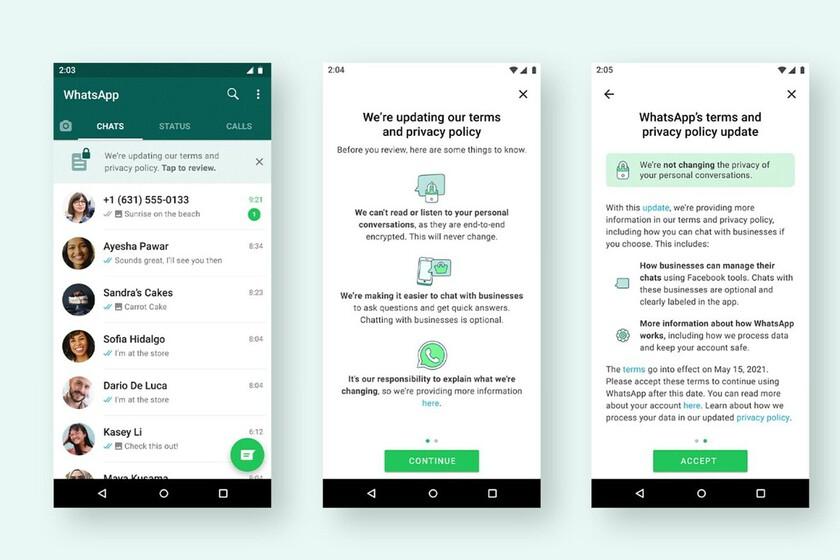WhatsApp changes its privacy policy in Europe from today to comply with the law: we thoroughly analyze the data you share
This year 2021 WhataApp announced a change in its privacy policy for users that has been so controversial that even as of today it will show certain changes in Europe. Let's remember that it had to delay its entry into force, clarify many points because users and also the authorities were skeptical and many users migrated to other platforms such as Telegram and Signal.
Starting today, users in the European Union will begin to see a banner (many of us still don't have it, but we can stay tuned, because it should happen soon) about WhatsApp's privacy policy, within the application. We won't have to accept it (most of us have already done so throughout this year, and those who haven't, still in October were still receiving notices to do so).
We must remember that WhatsApp was punished in September with a fine of 225 million euros for not being clear about how it uses our data and how it shares it with Facebook and with other companies.
The big problem that the authorities saw is that the messaging tool does not give enough information to users and non-users about what it does with their data and there is a lack of transparency in this regard. In the fine, in addition to the money the company had to pay, the firm was asked to add more information to the document about its privacy policy, such as the listing of Irish and EU laws on which it relies to process the data. .
Privacy Policy Changes Renewed Today
Changes include a reorganization of the document and the addition of more detail. It has also included more information about why data might be shared internationally and how that data is protected.

It is also added now that WhatsApp is one of the Meta companies (due to the name change of this social media empire). In the privacy policy that was available until yesterday, dated January, it was indicated that WhatsApp was owned by Facebook.
One of the main changes found in the new (and very long) privacy policy is how our information ends up in the hands of companies based in third countries like the United States, Israel or the United Kingdom that have different rules regarding to the protection of privacy. The text says like this:
You have to remember that depending on where a cloud company that stores data is based, the privacy laws that it has to comply with change.
Another of the changes that we have located addresses one of the most controversial issues in WhatsApp's privacy policy, which is the information it shares with Facebook and other services (it only adds more details, the bulk of the information is kept ). The new privacy policy reads like this:
WhatsApp can't give our information to Facebook, but it's not clear that it doesn't
Some of this information was already detailed. Now it is expanded. It must be remembered that when Facebook bought Whastapp for an exorbitant amount of money, the European Union authorities were reluctant to make the transaction due to the possibility that these two giants would share citizen information. Something that Mark Zuckerberg, the leader of Facebook flatly denied. We later learned that the head of Facebook lied on purpose to get the acquisition approved.
In the European Union, in fact, thanks to the General Data Protection Regulation (GDPR/RGPD) the capacity of action of this privacy policy that WhatsApp insists that we accept since the beginning of this year is limited, since it prevents that Facebook share WhatsApp data with the rest of the company for the company's own interest. But since a long list of lies is known in the history of this company, many people (including data authorities) are not trusting what is going to happen.
The company says that even if you can't share data, you must accept the privacy policy because "if we decide to share data with the Facebook Companies for this purpose in the future, we will only do so when we reach an agreement agreement with the Irish Data Protection Commission (company headquarters in Europe) regarding a future mechanism that allows us such use. We will keep you informed of new experiences we present and our information practices."
And these allegations have raised suspicions from the start. In the privacy policy updated today you can find much more information about how the company shares your data, what data it shares and with which countries.
